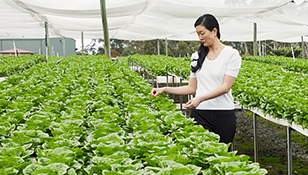Recycled products, environmental rebates, carbon neutrality and ethical supply chains are among common corporate sustainability claims. Many such statements are now under the microscope as part of national and international greenwashing inquiries. In the Griffith MBA course Accounting for Accountability with Dr Robyn Cameron, students learn about the latest trends in sustainability reporting.
Sorting the colours: why do you need to know about greenwashing in accounting?
"Accounting is not black and white. Leaders must look beyond the numbers,” Dr Cameron says.
“Our Griffith MBA students learn how to ask the right questions and how to interpret the results.
“We also look at how leaders might be able to use numbers to drive positive change.”
Accounting for Accountability is not a traditional accounting course, she explains.
“Rather than focusing on how to prepare a profit and loss statement, we show students how to consider different accounting frameworks and how to assess the professional judgement exercised when preparing statutory financial documents.
“One growing area we cover is sustainability reporting. As companies continue to expand their sustainability communications, regulator concerns around ‘greenwashing’ are likewise increasing,” she says.
‘Greenwashing’ as an online search term has increased by around 300% in Australia over the past few years. A March 2023 report from the Australian Competition and Consumer Commission identified that 57% of businesses had made “concerning claims about their environmental credentials”.
In May 2023, the Australian Securities and Investments Commission released its own report detailing greenwashing surveillance and subsequent interventions. And the Australian Senate is currently undertaking a landmark inquiry into greenwashing, with its final report due in December 2023.
Dr Cameron suggests organisations should aim to get on the front foot and give consumers confidence around the credibility of their green claims.
“Our Griffith MBA students learn how to ask the right questions and how to interpret the results."
Choosing the spin cycle: how to select a sustainability reporting framework
One of the biggest problems at the moment is that sustainability and climate-related reporting is largely non-regulated for Australian businesses, Dr Cameron states.
“There are a few different sustainability reporting frameworks, but entities can select which of these they adopt (if any at all), as well as which indicators they report on. Much is voluntary.
“So, we have the situation where companies choose their own sustainability story. Most tend to prioritise their successes and may omit or obfuscate their challenges.”
In fairness, Dr Cameron explains, one of the reasons this has occurred is because there haven’t been consistent, broadly accepted ways to “count” sustainability outcomes.
“In the world of accounting, if something can’t be measured, it’s not recognised in the financial statements.
“To improve consistency and comparability in financial reporting in this area, the International Sustainability Standards Board (a subset of the International Financial Reporting Standards Foundation) has recently issued two new standards,” she says.
These are the IFRS S1 for sustainability-related disclosure requirements and the IFRS S2 for climate-related disclosure requirements.
“These two standards are effective for annual reporting periods beginning on or after 1 January 2024 and are likely to significantly impact future sustainability reporting from corporations all around the world.”
Airing clean laundry: is your business prepared for regulation changes?
“I think that the current national and international focus on greenwashing will probably result in a move towards more regulation in this area,” Dr Cameron predicts.
“To a certain extent, this is already happening with some mandated disclosures. I foresee that the scope of sustainability reporting will only increase.
“What this will likely mean for accountants – and for leaders generally, who have a role in preparing statutory financial reports – is that they will need to understand how they can gather data for and include a range of auditable non-financial metrics in their disclosure statements.
“Organisations will need to really start quantifying how some of these indicators – particularly in areas such as extreme climate events or social and economic inequality – may have a material impact upon their financial performance and value delivery.
“This will be new territory for a lot of businesses. Managers and employees who are trained in this way of thinking will be well positioned to take on leadership and strategic roles that help steer their organisations towards a brighter, greener future.”
Scholarships
We offer a range of scholarships and awards to support international students studying our undergraduate, postgraduate, research and pathway programs.

Scholarships
We offer hundreds of scholarships, providing financial support to a wider range of students.

Scholarships
We offer hundreds of scholarships, providing financial support to a wider range of students.



















